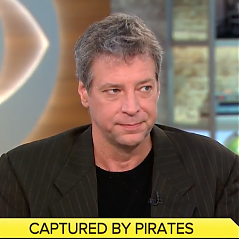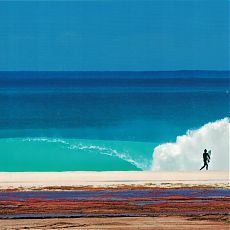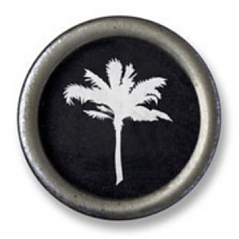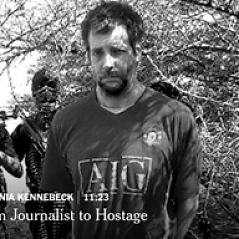Blog Archive

Hellfire from Paradise Ranch
My review of a book about the drone war, Hellfire from Paradise Ranch, is up at the Los Angeles Review of Books.
Read More Get UpdatesTwo Pieces of Fiction
A literary magazine in California, Kelp Journal, asked me for a piece of short fiction in 2019, and I handed them 2 linked stories. Both are about racism in my fictional town of Calaveras Beach, and both are based on real events. Bronzeville Beach and Supper Club deals with the first known black surfer in America, Nick Gabaldón, and gives us the town’s reaction to an African-American community expanding near a segregated strip of sand. Lighthouse Scene for Miles gives us the reaction of the town to a young Miles Davis, who really did play the beachside Lighthouse Café in 1953.
posted 9 December 2019 by Michael Scott Moore
Media Carousel
A collection of interviews about The Desert and the Sea is hard to miss if you scroll down the page, or click here, but what may not be completely obvious is that links in German can be found by clicking to the left, while a great deal of English-language media can be browsed to the right. It’s a rich record of things I’ve said in public about Somali pirates and the long hostage nightmare.
posted 21 November 2019 by Michael Scott Moore
The Man Who Toppled the Wall
Günter Schabowski was an unloved apparatchik of the East German government who brought down the Berlin Wall, inadvertently, during a rushed news conference on a new policy of tolerance for East Germans who were leaving the country in droves. Thirty years ago today he flubbed the announcement, and threw the government into confusion — which opened border crossings in the Wall, which started a chain reaction that collapsed the entire Communist bloc. Here’s a definitive English video about the whole thing by Deutsche Welle. Schabowski died in 2015, on November 1, and since then the Mauerfall anniversary also serves as a tribute to the Cold War’s last accidental hero.
posted 8 November 2019 by Michael Scott Moore
Vanishing Act
Very pleased to announce that I’ll be disappearing this March to the sleety wilds of southern New Hampshire, for a MacDowell Colony fellowship, to work on a new novel.
posted 28 January 2019 by Michael Scott Moore
One Pirate Arrested
A ranking Somali pirate guard was indicted last week in my case.
“When asked about the arrest of Mr. Tahlil, Mr. Moore replied, ‘I’m not as happy as you might imagine that he’s in jail.’”
posted 11 November 2018 by Michael Scott Moore
Freedom Anniversary, 2018

Four years ago this morning, on 23 September 2014, I woke up in a filthy house in central Somalia, feeling weak and miserable. I’d been captive for two and a half years and had no reason to think my status would change. My pirate guards fed me a sullen porridge of beans, the way you might feed a goat or a horse, and a few hours later they put me on the phone with a negotiator. The good man had no time to tell me a thing before one pirate grabbed the phone from my fingers — “Proof of life, only!” — and ended the call.
My blood pressure rose and stayed up for hours. I didn’t know what was about to happen. My heart just thumped with anger and grief. In most respects it was a normal day.
By the afternoon I was on a single-engine plane for Mogadishu. Twenty minutes after that I was on an Air Force transport plane for Nairobi. Thanks to the tremendous efforts of my family, the Pulitzer Center on Crisis Reporting, a number of US and German publications, members of the FBI and their German counterparts (the BKA), an unending nightmare had come to an end.
I wish I knew how to thank everyone.
For several months in Somalia this Nina Simone song had dominated the part of my mind that responds only to music. It’s called “I Wish I Knew How It Would Feel to Be Free,” and I caught a snatch of it on my shortwave early in 2014. It still wrenches me like no other song.
posted 23 September 2018 by Michael Scott Moore
CBS This Morning
An interview on CBS This morning ran live yesterday.
posted 23 September 2018 by Michael Scott Moore
Somalis and Tolerance

My op-ed from the Toronto Globe & Mail in early August explains how captivity changed my notion of Somali immigration to the West, maybe in unexpected ways. Now posted for good on the Journalism page.
posted 26 August 2018 by Michael Scott Moore
Journalism Under Siege
I had the honor of speaking with Diane Foley — Jim Foley’s mother — and Mike Boettcher at Oklahoma University, in late October, on the topic of violent threats to journalists around the world.
Journalism Under Siege October 25, 2017: Reporters are Dying to Cover #realnews from Ken Fischer on Vimeo.
posted 11 August 2018 by Michael Scott Moore
26 Hostages Freed in Somalia

The men from the Naham 3 are all friends of mine — a crew of 26 sailors from southeast Asia who worked on a tuna long-liner flagged in Oman but owned by a company in Taiwan, which abandoned them after Somali pirates hijacked the ship in 2012. By then pirates in central Somalia had captured me, and I suppose to save money they placed me on the ship for 5 months. I’ve kept quiet about this phase of my captivity, but now, two years after my release, the men are free. I went to Nairobi this week to see them. CNN interviewed a couple of us there (see below).
They weren’t fishing illegally. Somali pirates complain about rapacious fishing by foreign trawlers, but the Naham 3 was a long-liner — not a trawler, as reported in certain magazines — fishing outside Somali territorial waters as well as Somalia’s EEZ. It was an industrial ship, but not an illegal one. If Somalia had a working navy, rather than corruption in Mogadishu and a rash of pirates, these men would not have been captured.
Twenty-six freed hostages isn’t enough — the ship had an original crew of 29. Pirates shot the captain dead when they boarded. Two crewmen I knew in 2012 died of unnamed diseases, and Arnel Balbero addresses their needless deaths in the video. Around 15 people are still held hostage by pirates in diferent parts of Somalia, but the release of this crew represents the end of the heyday of Somali piracy, since the Naham 3 was the last major vessel to be hijacked between 2005 and 2012. I couldn’t be more delighted.
Re-posted in 2018
posted 28 July 2018 by Michael Scott Moore
"So, Where's Your Book?" 2
After a lot of work, it’ll be out on July 23 (tomorrow). To order, click on the left-hand side of the publishers’ page.

posted 23 July 2018 by Michael Scott Moore
Readings and Events
… this week, next week, and into the autumn for The Desert and the Sea:
July 19
Pages, a bookstore
7pm
Reserve early; ticket price includes book purchase
904 Manhattan Ave.
Manhattan Beach, CA
July 23
The Half King Bar & Restaurant
7pm
505 West 23rd Street
New York City
July 28
Politics & Prose Bookstore
1pm
5015 Connecticut Ave NW
Washington, DC
August 1
Vroman’s Bookstore
7pm
695 E Colorado Blvd
Pasadena, CA
September 4
USC Annenberg School of Journalism
Los Angeles, CA
Details to come
October 17
Mechanics’ Institute Library
Part of LitQuake
7pm (subject to change)
57 Post St.
San Francisco, CA 94104
October 18
Book Passage
7pm
51 Tamal Vista Blvd.
Corte Madera, CA 94925
October 22
The Frontline Club
13 Norfolk Pl
London, UK
Details to come
posted 19 July 2018 by Michael Scott Moore
Pre-Publication Opinion
The first general assessment of The Desert and the Sea is a starred review in Kirkus.
There’s plenty of gallows humor as Moore settles in for his long spell of unhappiness. When his young captors, ‘stoned on narcotic cud,’ blast music from their cellphones, he asks a senior to get them to turn it down. ‘They’re soldiers,’ he’s told by way of explanation, to which he replies, ‘ask them to be quiet soldiers.’ … A deftly constructed and tautly told rejoinder to Robert Louis Stevenson’s Kidnapped, sympathetic but also sharp-edged.
posted 15 May 2018 by Michael Scott Moore
On the Telly
CNN ran an interview last week about my ordeal in Somalia. It accompanied a report about Somali pirate bosses, including Mohamed Garfanji, falling under investigation for links to al-Shabaab.
posted 14 July 2017 by Michael Scott Moore
Humor, Survival, and Somali Pirates
A few minutes about the long ordeal in Somalia at TEDxBeaconStreet, November 2016.
A printed version of what happened in Somalia is available as a Long Read at The Guardian, and, in somewhat shorter form, for German readers, in Der Spiegel. It’s not even near complete. Enormous parts of the story have been left untold. They’ll have to wait for a book (until about March, 2018?).
Meanwhile, a short Radio 4 interview about the story aired on the BBC as well as NPR. It’s archived here, at 29 min 55 sec. And the Pulitzer Center on Crisis Reporting has a roundup of coverage so far.
posted 28 December 2016 by Michael Scott Moore
"So Where's Your Book?"

Some people have asked about the Somalia memoir. It’s right on schedule, I promise, but it won’t be out for at least another year. It’s been revised in full, twice (see above), and it’ll need a few more revisions before we get anywhere. Old-fashioned authorship. July, 2018?
posted 2 October 2016 by Michael Scott Moore
Sunday at Alexanderplatz

Just a street drummer in a giraffe mask.

posted 1 October 2016 by Michael Scott Moore
Planet Waves

While I was in Somalia a man called Geoff Carter wrote about a picture of Indian men surfing on stand-up boards around 1800 off Chennai, which altered the known history of surfing a bit, even though the picture was hiding in plain sight at the Australian National Maritime Museum. Madrassan Men Surfing (scroll to #13) shows some local men loading an East India Company freighter near Madras Roads using a “catamaran,” a three-log board that was probably invented for fishing. (Above you see a photo from the ’40s.) An Indian catamaran is similar to the Middle Eastern hasake and the Peruvian caballitos de tortora — both fishing boats used for navigating waves while standing. For a long time no one grasped just how old these Indian contrivances were, even though the English captain and pirate William Dampier, who circumnavigated the globe in the 17th century, saw caballitos de tortora in 1684 and remembered similar surf-boats from the Bay of Bengal: “On the Coast of Coromandel in the East-Indies they call them Catamarans.”
It’s always interesting when old examples of stand-up surfing turn up outside Hawaii. The roots of the modern sport are still Polynesian, since no one seems to have surfed on their feet, without a paddle, just for fun, outside Hawaii until George Freeth and Duke Kahanamoku became “surf ambassadors” from Hawaii in the early 1900s. But the idea that people were stand-up paddleboarding before 1800 off Chennai — where modern surfing has just taken hold — is fairly wonderful.
For more, as usual, see Sweetness and Blood.

posted 10 August 2016 by Michael Scott Moore
The Long Read

A version of what happened in Somalia is available as a Long Read at The Guardian, and, in somewhat shorter form, for German readers, in Der Spiegel. It’s not even near complete. Enormous parts of the story have been left untold. They’ll have to wait for a book. But it was important to lay out some basic facts and correct the strange idea that I had traveled in Somalia without security. That rumor was nonsense, and the rumor that I’d been shot in the hand was also pure pirate fabrication. Those bits of gossip had a strange half-life among my friends after I went free; now I hope they’ll be put to rest.
A short Radio 4 interview about the story aired on the BBC as well as NPR. It’s archived here, at 29 min 55 sec. And the Pulitzer Center on Crisis Reporting has a roundup of coverage so far.
I want to thank everyone who helped get me out of Somalia, in Germany and the United States, and for the still-astonishing support from my family and friends.
ALSO: The picture above shows our arrival in Hobyo in January 2012, several days before my abduction. A Land Rover shaped in plaster, on the right, decorates the mansion of a Somali pirate boss named Fatxi.
Republished from June 3, 2015





























